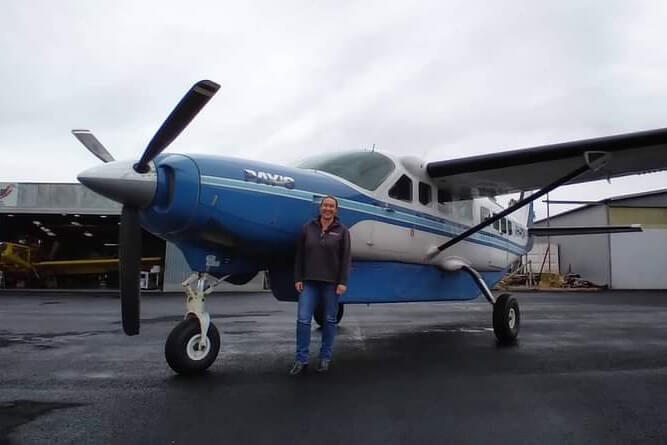From a dream job in the States to sleeping in a tent and finally ferrying tourists to the Outback, it’s truly been a rollercoaster year for Australian pilot Hunter McLeod.
Hunter got into aviation later in life while on a work trip as radio announcer to interview Beyonce in New York. Once bitten by the bug there was no looking back.
“I thought, you know what, this would be the best job ever if I could travel for a living and get to stay in fun hotels, and meet wonderful people”. She quickly got a cabin crew job at Qantas but it didn’t quite fit.
“I was very quick to realize I was probably in the wrong end of the aircraft. I wanted to be at the front,” she explains.
Once she completed her training, Hunter worked as a charter pilot and flight instructor building up her hours in her native Australia.
In June 2019, she landed her dream job for U.S. airline ExpressJet Airlines.
“I always wanted to move to America. And it just all seemed to line up perfectly. I had the perfect amount of hours. At that time the USA was just sucking up pilots as quickly as they could.”
Hunter packed up her things, sold her car and moved to the States, with only two suitcases in tow. She thought she was leaving Australia for good.
But then the pandemic hit.
“About February, the terminals went very quiet. And by March, my roster was looking pretty empty. And then it was really starting to sink in that something’s seriously happening,” she remembers.
Support from the CARES Covid relief package provided by the U.S. government helped keep her company going for a while, but it was not enough. Hunter also drained her own savings while she was grounded. In October, the American dream ended for Hunter and she again found herself packing up her life and taking those suitcases to the airport.
But it was a very different Australia to the one Hunter had left. Not only had the country shut its international borders, but its individual states had also closed their domestic borders, meaning there was virtually no flying going on anywhere.
Having depleted her savings in Chicago, shaken by the crisis and with no money for rent, Hunter ended up buying a tent and camping in her mum’s back garden for three months while she picked herself back up.
“There were no aviation jobs. That was a wipeout. So I knew I had to find something completely separate.” She applied to work as truck driver in the mines, as a bus driver, and also tried for bar work but with hundreds of people fighting over the few jobs available, the market was tough. In the end, she got some work as a nanny for a friend.
Finally her luck turned when a former pupil sent her resume to a friend who worked for a charter company, Pay’s Aviation. The nine hour drive for an interview at the company paid off.
“I spoke to the fabulous Ross, my new boss. And after about an hour he told me to come back tomorrow and sign the papers. So I’m very lucky and thankful and bewildered almost that I could find a job at this point in time.”
While Pay’s does a lot of agricultural work, Hunter will mainly be flying tourists on outback tours, piloting a 14-seater Caravan plane.
“We need to take people on holidays, people still want to go and explore and have fun and have a good time,” she says.
Domestic tourists may be Hunter’s bread and butter for a while now. Even with the Trans-Tasman bubble opening up with New Zealand, Hunter remains cautious about the prospects for recovery in international aviation, predicting that it may take until 2023 for things to return to normal.
“One day everything’s rosy. And then the next day or by midnight, they’ve closed the border. So people are scared to travel. That’s still making me nervous as much as I would hope and love that to be the start of the open up,” she says.
Her tip for those struggling with the pandemic is to get out and exercise.
“The more I exercise, the more I walk, the more I do yoga, the better I am mentally and the more I’m willing to keep going and keep pushing for aviation,” she says.
Hunter is very happy to be at Pay’s and is having fun. As with many pilots, she is not ruling out a job further afield in the distant future, whether back in the States or somewhere else entirely.
“We’ll wait and see how it all plays out. I maybe eventually would like to end up in Asia, that’s always been a bit of a goal as well.”
The pandemic has also proven Hunter’s adaptability. As Hunter says, she can live out of a bag and her home can be anywhere, even a tent in a back garden!
“If the pandemic has taught me anything, it’s that I can’t plan a single thing. Because as soon as I make a plan, it is going to just change at the drop of a hat.

